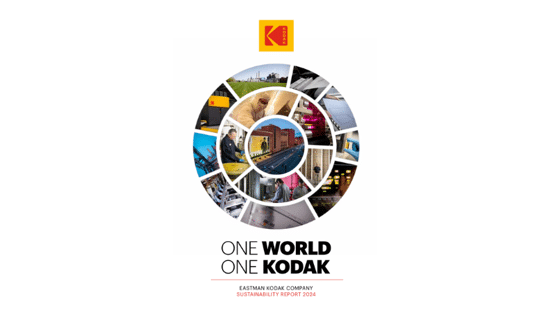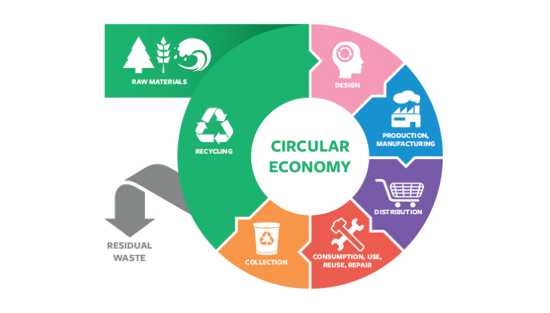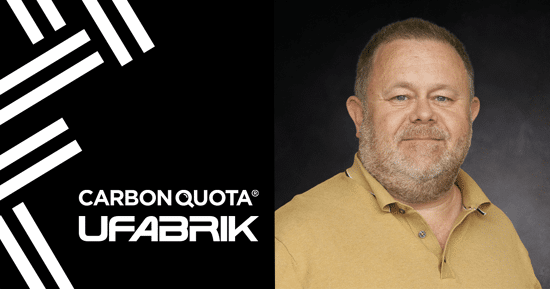You don’t have to be perfect, just do your best

Clare Taylor shares the importance for all businesses regardless of their size to start their sustainability journey. Clare speaks to Nathan Swinson-Bullough from Imageco about their sustainability journey.
Starting out to make your business more sustainable can be daunting. There are so many things to consider, so many issues hitting headlines, customer questionnaires to answer, so many changes to make, so much to learn.
It’s best not to worry – just get started, do your best and learn as you go. Focus on what you care about most personally, what your staff care about and what your customers care about – they may not be the most critical issues, but if they’re what bring people along with you, they’ll be the most effective. The rest you can learn as you go along: make that part of your plan.
Nathan Swinson-Bullough took his company, Imageco, along this journey, winning many industry awards for what they have achieved, and has kindly agreed to share what he learned on the way.
He started out because he’d always been a lover of the outdoors and nature: since childhood he’d watched programmes and read books by David Attenborough. Seeing Blue Planet II, with its images of the ocean covered in plastic, made him take serious notice of what was going on out there in the world. He says he’s embarrassed that it took this for him to realise, but most of us need a trigger. He decided to make the changes and did so, demonstrating what can be done by a small business in difficult times. He knew global warming was a problem but, like many, always thought it out of his control. The television images he saw were a turning point; he realised that we are all responsible for this as consumers and business owners, so felt he had to do something about it and change his company, Imageco.
As a starting point, he reviewed the substrates they use, looking for more sustainable options and testing for suitability. Once word got out, it became easier as suppliers came to him. Realising how much of an issue production waste is, he found a technology solution to improve efficiency in nesting jobs. He also invested in technology other parts of his operation to enhance sustainability, ranging from printing plant to voltage optimisation.
Although, as for everyone, Covid created problems, it also created some quiet time to plan strategy and further investment for a financially as well as environmentally sustainable business. As part of this, Imageco had photovoltaic panels installed during Covid, which involved ingenuity in finding areas to supplement the roof: they even have panels on the containers outside.
Having started out as someone who was simply trying to do the right thing, but was not an expert, Nathan was surprised found himself an industry leader. He found this a rewarding experience: he had made a difference to his own business, and others were influenced by what Imageco were doing and making changes themselves. He also found it helped that his family were supportive, especially his wife – she is very proud of him and his environmental achievements. He wishes his grandfather could see him now; he always encouraged him as he studied and learned and would be amazed if he could see him driving around in a car powered by electricity.
Customers soon embraced the changes, and things really took off once they took on a cardboard engineer to make the most of what can be done using fibreboard to replace less sustainable products. Having a strong marketing message helped, making sure everyone understood what the business is doing.
The more difficult parts of the journey were accepting that perfection isn’t possible – there are still areas for which materials are limited as yet, and more sustainable options not available – and keeping on top of all the work required for certification to ISO 14001. That required external support, and an aptly named staff member – Terry Green – to look after the documentation and day-to-day system work.
Overall, Nathan says he found having a clear vision of where he wanted to go and a great team around him made all the difference. He feels proud of all they’ve achieved and wants to help others on their own journeys.
So what are the key points?
You don’t have to be perfect – just do your best and learn as you go. Don’t try to tackle everything at once; start with what’s most important to you, your staff, your customers, and it’s easier to bring them along with you. Having a good team makes a big difference, and so does celebrating your achievements with them, not forgetting your family, too.
Be prepared to change things as you learn more, and to learn from what doesn’t work so well – no blame, just learning. The management-speak term for this is the PDCA cycle: Plan what you intend to do; Do what you’ve planned; Check how it’s working; and Act on what you find, starting the cycle over again so that you’re constantly building on your knowledge and improving.
It is not the easiest of journeys but is ultimately rewarding, not just for everyone’s futures, but also for the satisfaction of knowing you’re doing the right thing, for leading the change and helping others, for being able to offer something better to customers, and for making people proud of your efforts.
For more information about Clare Taylor Consulting and her services visit here: http://www.clare-taylor-consulting.co.uk/
Topics
Recent news

Kodak's 2024 Sustainability Report: A Commitment to a Greener Future
Kodak's 2024 Sustainability Report, "One World, One Kodak," demonstrates a strong commitment to environmental and social responsibility. The report highlights impressive reductions in greenhouse gas emissions (56%) and water withdrawal (31%) and aims for zero waste by 2025. Notably, Kodak is pioneering double materiality assessment in the printing industry, aligning sustainability with financial reporting, and showcasing its products' environmental benefits.

How can printers lower costs on energy usage?
Clare Taylor outlines simple steps for businesses to achieve energy sustainability, focusing on cost savings and staff comfort. It emphasises starting with measuring energy consumption to identify key areas for improvement. Subsequent steps involve managing energy use through behavioral changes and low-cost interventions, like optimizing cooling settings and ensuring equipment is switched off when not needed.

The European Union's circular economy plan
Printing companies must understand the EU's Circular Economy Action Plan (CEAP), part of the European Green Deal. These initiatives drive sustainability, impacting businesses globally, even if not EU-based, through customer requirements. Printers need to be aware of reporting and sustainability expectations to manage risks and retain clients.

A revised look at sustainability in wide format print
Sustainability is crucial for wide-format print, moving beyond marketing to an imperative driven by brands and regulations. Common "eco" claims often mask complexities; true sustainability demands carbon reduction as a core principle. Life Cycle Assessment (LCA) offers data-driven insights for genuine environmental improvement, as demonstrated by UFABRIK's transparent approach.